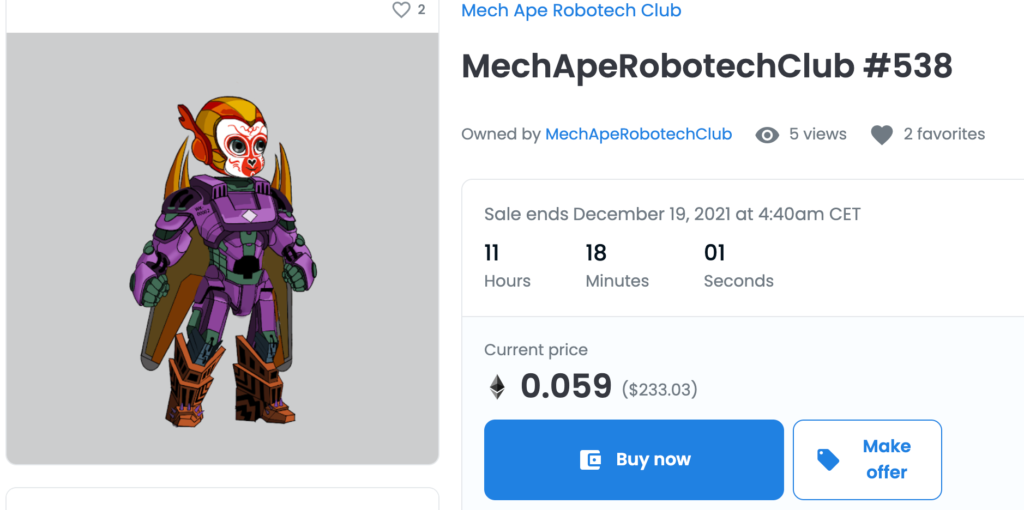We have examined the general conditions of OPENSEA available HERE.
The platform clearly presents itself as an online auction link:
“This Service also allows you to sell and purchase Crypto Assets (as defined below) via auction (“Auction”). Detailed rules regarding the Auction process are available on this page, Auction Rules.)”.
Auction rules are available separately HERE.
Thus, OpenSea does not intervene in any way between the buyer, the seller and their contractual relationship:
In view of all the above, especially in terms of the articulation between copyright and real rights (ownership, NP, UF, undivided), authenticity, pedigree,… OpenSeA offers NO WARRANTY:
In the end, the only guarantee remains the conditions imposed on each user:
You agree that you will not violate any law, contract, intellectual property or other third party right, and that you are solely responsible for your conduct, while accessing or using the Service or participating in the Auction.
You agree that you will abide by these Terms and will not:
- Provide false or misleading information to OpenSea;
- Use or attempt to use another user’s Account without authorization from such user and OpenSea;
- Create or list counterfeit items;
- Pose as another person or create a misleading username;
- Use the Service in any manner that could interfere with, disrupt, negatively affect or inhibit other users from fully enjoying the Service, or that could damage, disable, overburden or impair the functioning of the Service in any manner;
- Develop, utilize, or disseminate any software, or interact with any API in any manner, that could damage, harm, or impair the Service;
- Reverse engineer any aspect of the Service, or do anything that might discover source code or bypass or circumvent measures employed to prevent or limit access to any Service, area or code of the Service;
- Attempt to circumvent any content-filtering techniques we employ, or attempt to access any feature or area of the Service that you are not authorized to access;
- Use any robot, spider, crawler, scraper, script, browser extension, offline reader or other automated means or interface not authorized by us to access the Service, extract data or otherwise interfere with or modify the rendering of Service pages or functionality;
- Use data collected from our Service to contact individuals, companies, or other persons or entities;
- Use data collected from our Service for any direct marketing activity (including without limitation, email marketing, SMS marketing, telemarketing, and direct marketing);
- Bypass or ignore instructions that control all automated access to the Service;
- Use the Service for any illegal or unauthorized purpose, or engage in, encourage or promote any activity that violates these Terms;
- Use the Ethereum Platform to carry out any illegal activities, including but not limited to money laundering, terrorist financing or deliberately engaging in activities designed to adversely affect the performance of the Ethereum Platform, or the Service;
- Engage in wash trading or other deceptive or manipulative trading activities;
- Place misleading bids or offers;
- Spam listings for the purpose of causing a listing to appear at the top of the search results;
- Engage in behaviors that have the intention or the effect of artificially increasing view counts, favorites, volume, or other metrics that OpenSea might use to sort search results;
- Use the Service to carry out any financial activities subject to registration or licensing, including but not limited to creating, listing, or buying securities, commodities, options, real estate, or debt instruments;
- Use the Service from a country sanctioned by the government of the United States; or
- Use the Service to participate in fundraising for a business, protocol, or platform, including but not limited to creating, listing, or buying assets that are redeemable for financial instruments, assets that give owners rights to participate in an ICO or any securities offering, or assets that entitle owners to financial rewards, including but not limited to, DeFi yield bonuses, staking bonuses, and burn discounts.
However, the user of the platform grants him rights of use (license) of his copyrights which are particularly broad and “ill-defined”
You are solely responsible for your use of the Services and for any User Information you provide, including compliance with applicable laws, rules, and regulations. We take no responsibility for the User Information posted or listed via the Services.
You retain your rights to any User Information you submit, post, or display using the Services.
By submitting, posting or displaying User Information on or through the Services, you grant us a worldwide, non-exclusive, sublicensable, royalty-free license to use, copy, modify, and display any text, content, files, communications, comments, feedback, suggestions, ideas, concepts, questions, data or other content that you submit or post on or through the Services or through tools or applications we provide for posting or sharing such content (collectively “User Information”) for our lawful business purposes, including to provide, promote, and improve the Services.
OpenSea does not claim that submitting, posting or displaying User Information on or through the Services gives OpenSea any ownership or resale rights in your User Information. We’re not saying we own it or will resell it. We’re just saying we might show it off a bit.
There is no provision for copyright to be assigned or licensed to purchasers – necessarily in writing as we have seen.
The buyer of an NFT on OpenSea can be more or less sure that the seller owns both the medium of the work (the NFT listed on the platform) and the related copyrights. However, he does not acquire the copyrights on these works via the transaction that takes place on the platform:
You are hereby granted a limited, nonexclusive, nontransferable, nonsublicensable, and personal license to access and use the Service and Content; provided, however, that such license is subject to these Terms and does not include any right to (a) sell, resell or use commercially the Service or Content, (b) distribute, publicly perform or publicly display any Content, (c) modify or otherwise make any derivative uses of the Service or Content, or any portion thereof, (d) use any data mining, robots or similar data gathering or extraction methods, (e) download (other than page caching) any portion of the Service or Content, except as expressly permitted by us, and (f) use the Service or Content other than for their intended purposes.
Thus, the buyer of an NFT on OpenSea, in the absence of a specific contract with the seller, does not have the right to :
- Reproduction (on a website or in a book, photographs, postcards, posters,…)
- Adaptation and translation (including creating variations of the NFT)
- Renting and lending (think of making the work available in exhibitions or museums)
- Communication to the public (internet, radio, television, satellite, cable or digital,…)
Note that exceptions to copyright are provided for in articles XI.189 and following CDE.
This seems to us to be particularly important with regard to the moral rights that remain with the seller of the NFT: – the right of disclosure, – the right to authorship, – and the right to the integrity of the work. If these rights cannot be transferred (article XI .165, § 2
CDE), although the author may waive this right, he or she retains in any case the right to object to any distortion, mutilation or other modification of his or her work or to any other infringement of the same work.
If the author’s right to decide when the work is finished and can be disclosed, to claim (or not) authorship, integrity is of particular interest to us.
No modification may be made to the work by anyone other than the artist (e.g. the buyer or the gallery owner).
 The famous “Bernard Buffet” case rendered by the French Court of Cassation in the 1960s illustrates this principle perfectly. The artist Bernard Buffet had painted the panels of a refrigerator. The work was then sold at auction as part of a charity sale. The owner-purchaser later dismantled the different panels to sell them separately. The French Court of Cassation stated that an artist’s work could not be mutilated or distorted. In the case of the refrigerator, the Court confirmed that the work had indeed been mutilated, and that this constituted an infringement of the author’s moral rights, more precisely his right to the integrity of the work.
The famous “Bernard Buffet” case rendered by the French Court of Cassation in the 1960s illustrates this principle perfectly. The artist Bernard Buffet had painted the panels of a refrigerator. The work was then sold at auction as part of a charity sale. The owner-purchaser later dismantled the different panels to sell them separately. The French Court of Cassation stated that an artist’s work could not be mutilated or distorted. In the case of the refrigerator, the Court confirmed that the work had indeed been mutilated, and that this constituted an infringement of the author’s moral rights, more precisely his right to the integrity of the work.
Read also: Denaturing a work (en)
How can we guarantee on these platforms that the seller will not claim his copyright, economic rights (reproduction, adaptation or translation, rental and lending, communication to the public) or moral rights (disclosure, paternity and integrity)?
The platform does not allow to enter in communication with the seller who would not often be inclined to sign other contractual documents for works selling for a few hundred dollars (in the best of cases):






